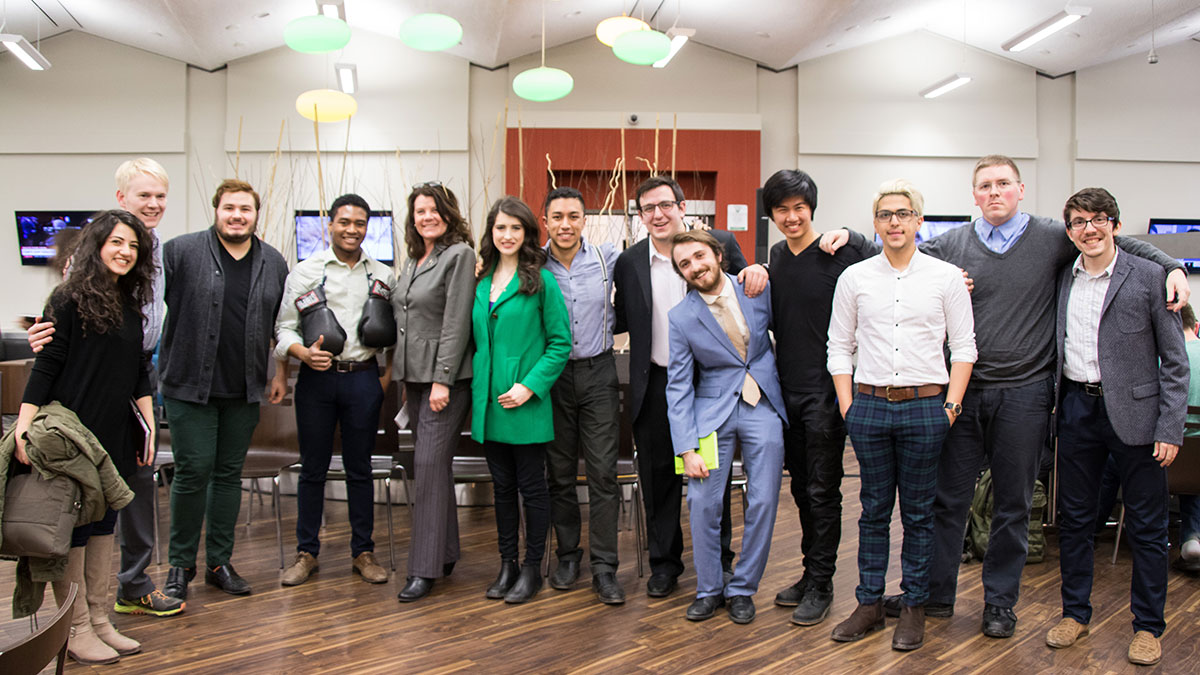Residence advocacy a big ticket topic at Lister forum
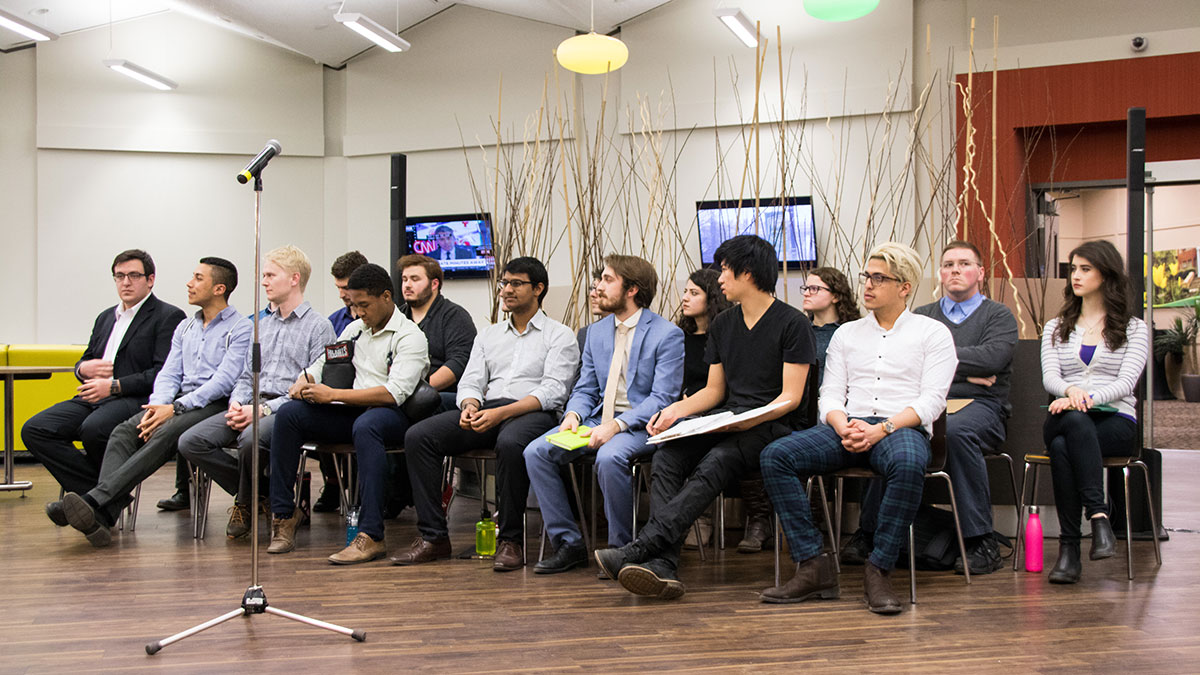 Christina Varvis
Christina VarvisStudent Life candidates tackle residence student life
VP (Student Life) candidates Levi Flaman, Kevin Wang, Jordan Simao and Francesca El Ghossein received overwhelming attention during the Lister Forum Q&A session, though they answered resoundingly to almost every question. Their response was simple: consultation.
“In its current form, channels of communication between residents and Residence Services are fractured,” Simao said. “Absolutely no consultation is done.”
Flaman agreed with Simao, adding university relations need to come from a bottom-up scheme starting with students.
“While (university administrators) are sitting in their ivory tower deciding what’s best for students, it should be students deciding what’s best for students,” Flaman said.
Consultation will be especially important for the incoming VPSL, as Residence Services are currently planning the construction of two new student housing projects: Lister 5 and East Campus Village 9. While El Ghossein advocated for a committee to oversee the new project’s budget — adding that a committee “is more binding than consultation” — all candidates agreed student input is crucial.
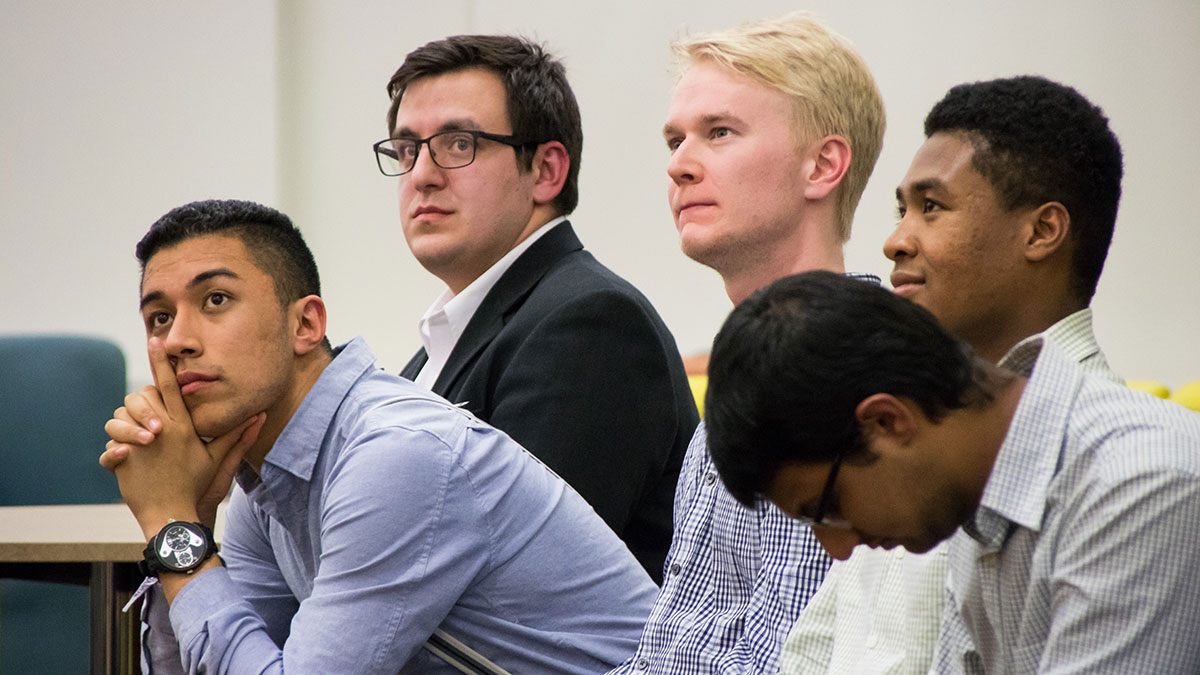
“The university should be more open in how they conduct their affairs in general, but I feel like when it relates to this aspect of student life, they definitely need to consult with students,” Wang said.
A significant concern raised by both candidates and audience members was the need for a new student group to replace the Lister Hall Students’ Association, which was suspended in 2014. The issue, like Residence Services’ new student housing project, is time-sensitive, given all Lister towers, except Schaffer Hall, will become first-year-only residences next year.
“The pro is space, but that’s not even an issue because … no towers are full right now,” Wang said. “The cons: no mentorship, no academic support, and no lifestyle support. Residence Services will be spending a whole bunch of money on that, when we are already doing that on our own for free.”
Simao endorsed an expansion of the Basecamp orientation program. El Ghossein, however, refused to entertain any alternative solutions.
“Having no residence association is disastrous, having a first year residence is bad, but the combination of the two is a catastrophe,” El Ghossein said.
“The university is trying to combat a drinking problem, but then they put first year students together in a residence? Good luck.”
Presidential candidates push for residence advocacy
The three candidates in the race for Students’ Union President were mostly united in their stance on residence affairs in Thursday’s forum in Lister Hall.
Speaking on issues with residence services, construction of new residences and the residence structure going forward, the candidates agreed when it came to strengthening residence.
With the disbanding of the Lister Hall Students’ Association (LHSA) last year, all of the candidates said they were committed to creating a new representative body in Lister.
Dylan Hanwell said that “allowing students to build a community” was key moving forward, while Cody Bondarchuk advocated the implementation of student consultation to act as a check on University decisions.
“When the university wants to do something, they tend to steamroll past students,” Bondarchuk said. “They tend to push things through and ask questions later.”
Fahim Rahman agreed with the others, saying that students in residence “consider campus home,” and that student services had to be better in residence.
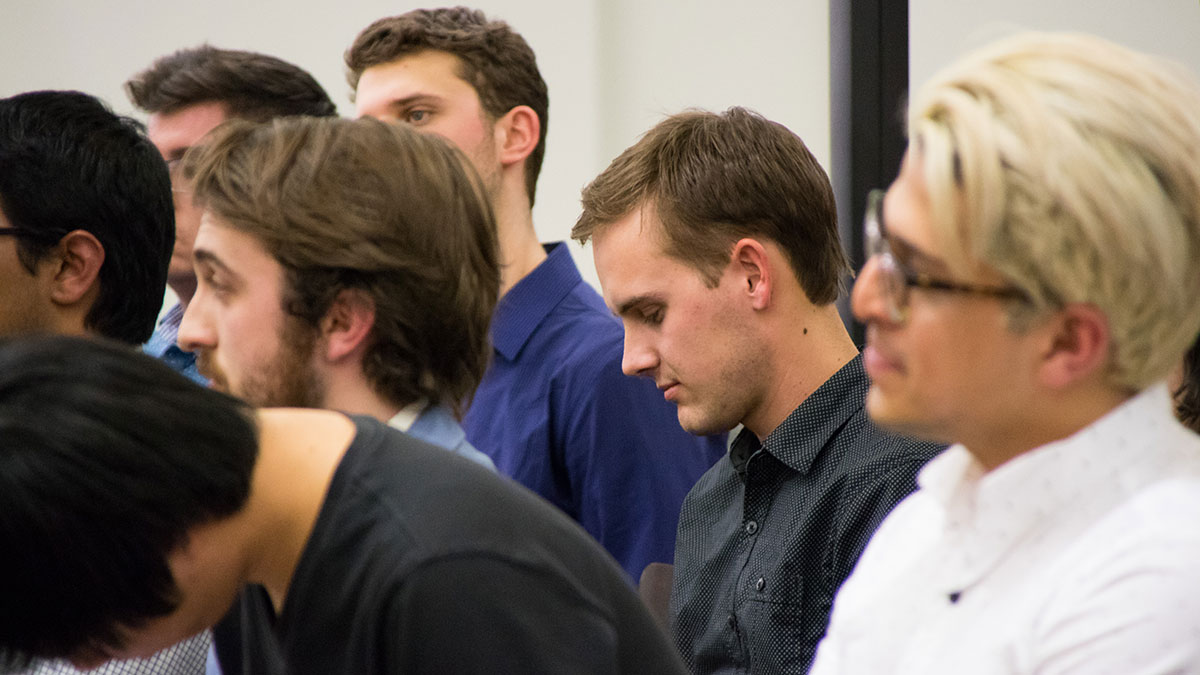
University President David Turpin has pledged to make a spot in residence available for every first-year student. To achieve this, the university has proposed designating Lister Hall as a first-year only residence. For the presidential candidates, this change would bring about irreparable damage to the quality of life of students in res.
“With only first years living in Lister, you have no continuity (in student leadership) and can’t tackle issues year-to-year,” Rahman said. In addition, he pledged to take residence issues straight to the desk of President Turpin, rather than letting them go through normal channels.
Bondarchuk said he would sit on the Property and Finance subcommittee of the Board of Governors, and that a lack of consultation can be partially resolved there.
Like Rahman, Hanwell also said he would go straight to the president on residence issues. In addition, he suggested impacting the bottom line of residences would make change. To do this, he proposed the formation of social media accounts detailing issues with residence, thereby giving prospective residents pause on living in university housing.
For Hanwell, “finding that bottom line and pushing on it by making these things public” would go a long way to resolving issues in residence and its ancillary services.
Concerns about construction quality in new buildings, and perpetual weakening of residence associations were significant talking points for the presidential race on Thursday, and will likely make up a large part of the job next year.
Personal politics brought into play for BOG Rep
In the race for the Board of Governors representative position, Colin Champagne is now running unopposed after Umer Farooq withdrew his candidacy earlier this week.
Despite the lack of competition, Champagne said he was focused on working hard for the student vote. When it comes to residences, he compared their current state to “a roof without a foundation,” and said the BOG Rep position could do a lot for advancing the student perspectives on issues in residence.
“If they want to build new residences or change current ones, it goes through the Board,” Champagne said. “If we could show that it would be detrimental to separate junior and senior students, the board could change that.”
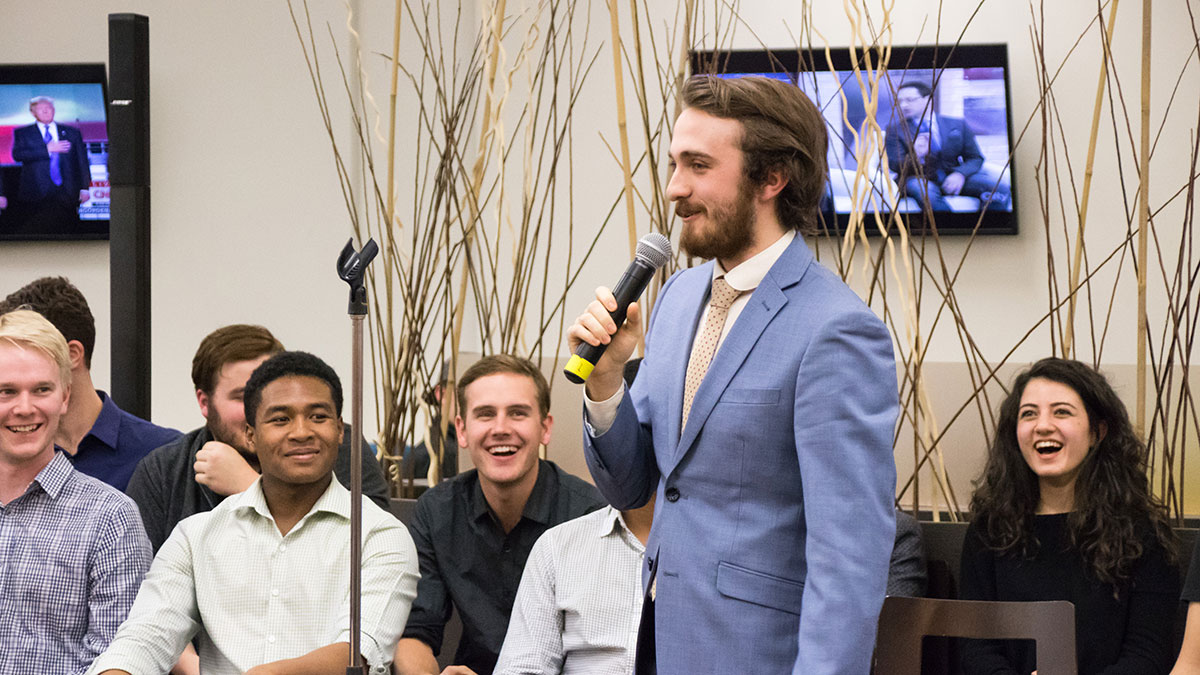
Champagne also said that more senior students often serve as mentors in residence environments, getting first and second-years involved and out of their comfort zone. Consequently, he said he advocated for residences with a wide range of student seniority levels.
In the lone question from the audience, Champagne was asked whether his political affiliations would prevent him from working effectively with the board.
In response, Champagne said he intended on maintaining a neutral political stance.
“I see myself as having a critical point of view,” Champagne said. “I don’t have a party membership, and I just helped one candidate. I’m representing students, that is my job, and their opinions are what will be brought up.”
With a vote on the largest decision-making body at the university, the BoG rep position will play a large role in the way residence issues are handled in the next year.
VPX hopefuls focus on affordability
The Vice President (External) race focused on problems surrounding residence, which require action outside of the university to solve.
Mike Sandare and Patrick Cajina said that affordable education was the most important issue facing students. Sandare talked about “realistic change” in this area, and said that a long-term funding model would give the university more resiliency, and therefore make student costs more predictable. Currently, the university is told each year what funding it will receive, and this can lead to unexpected cuts which create higher student fees.
“The year-by-year funding model doesn’t work,” Sandare said. “I want a good framework and to see students be able to afford their degrees.”
Cajina said his vision was to give everyone a chance at education regardless of financial background, and also pointed to free tuition for low income families as something that could work in Alberta.
“I think the Ontario system is absolutely possible (in Alberta) with (provincial) NDP and (federal) liberal governments. We should use the NDP opportunity to its fullest extent. The quality of education should not be associated with how much we are paying.”
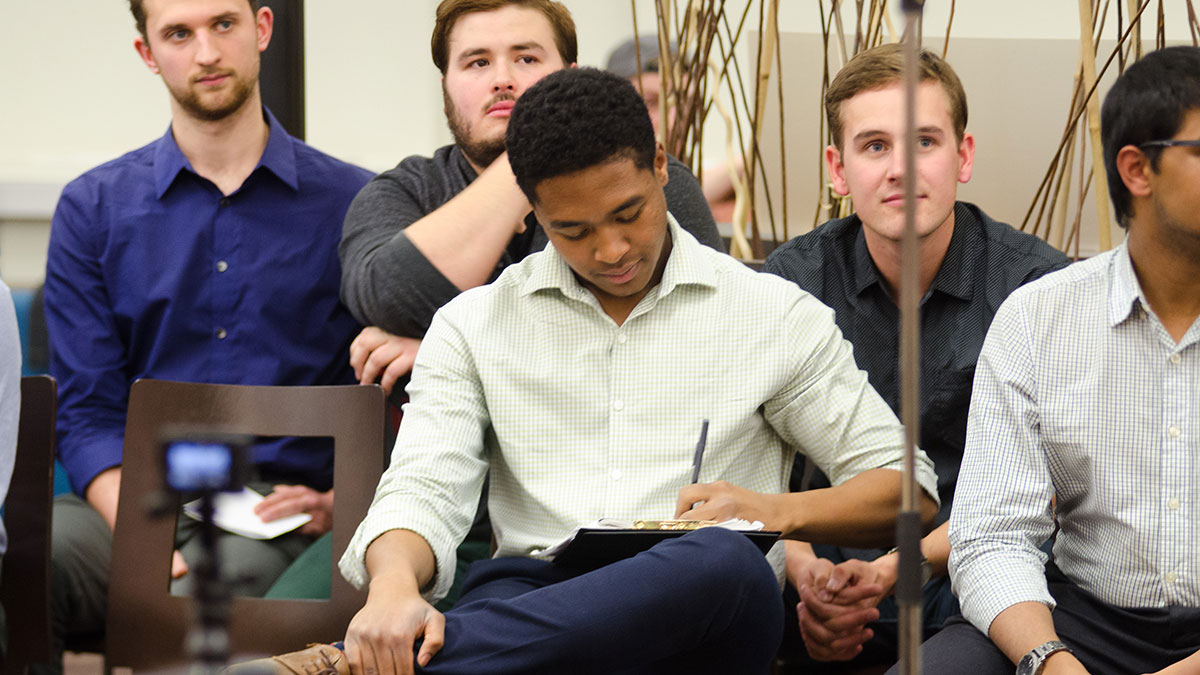
Reed Larsen emphasized his relationship with residence, as he currently lives in one, and said there was a lot that the VP (External) position could do to help students living there. He said he would work to get residences included in the Residence and Tenancy Act, so residents have the same rights as normal renters. In addition to making residence more equitable, Larsen said he would work to ensure student well-being is maintained after moving out of residence.
“I want to make sure that when you leave residence, you move into a home that is not derelict,” Larsen said. “I would really like to see the municipal government develop those properties in a way that is accessible to students.”
When asked by the audience what they would do to lessen the burden on international students living in residence, all of the candidates said they would work for increased advocacy and predictable fees.
Larsen called international tuition and fees “exorbitantly expensive,” and that he would work to check the power of the university when it comes to fee changes.
“Right now they are the only students who don’t have a say in regulating their fees,” Larsen said. “It is one of those things that they can raise or lower at their own whim.”
Cajina proposed that having the International Students’ Association go back to its original purpose as an advocacy body would also help in addressing these issues.
“The ISA has become primarily an event-promoting organization,” Cajina said. “They should go back to their roots of advocating for international students.”
Sandare pointed to a multi-year funding plan for universities as something that would address international student fees, as more predictable funding would mean not having to balance the budget on the backs of international students.
“Some (international) students had their tuition go up by 150 per cent, which is ridiculous,” Sandare said. “With the university knowing in advance what their budget will be year after year, they will spend within that.”
These issues with residence will continue to remain contentious parts of the VP External campaign, and will require extensive attention to whoever fills the position next year.
Meal Plan and building quality on docket in Ops Fi race
Tensions ran high when the VP (Operations and Finance) candidates Robyn Paches, Hasan Birer and Taimur Malik discussed their role in resident life.
Though Paches, who has never lived in on-campus housing, said he was “the only Ops Fi candidate who cares about residences,” Birer, an international student, and Malik, who lived in Lister for three years, were quick to affirm their personal reasons for pursuing goals in residences.
“The experience and the culture and the bonds you form here, nothing else can beat that,” Malik said.
The VP (Ops Fi) candidates received only one question during the Q&A period regarding the limited venues on campus that accept Lister meal plans. While Malik said creating more meal choices is beyond the VP’s control, he advocated for consultation of how residents on a meal plan can best use the Students’ Union Building (SUB).
“We can ask Lister folks, ‘What exactly are you missing in Lister that we can provide in SUB?’” Malik said.
“We can try to negotiate with the university when the next Aramark contract comes up to see if we can get a better deal, but … what I can truly promise (are) more healthy options, more cost-effective options, and cheaper food in SUB.”
Paches countered Malik’s statement that the SU does not have the power to influence businesses on campus to accept the Lister meal plan. He proposed creating a deal with Chopped Leaf, a new business that was installed in Van Vliet Centre this past summer.
“Hundreds of Lister students pass by that business every single day, but they do not accept (the) meal plan,” Paches said.
“(A deal) would not only increase profits for them, but increase convenience for Lister students.”
Birer’s solution to the limited options for students on meal plans was to create arrangements with the Multicultural Community Association and similar organizations around Edmonton to provide students with “weekly cultural days” that would include a variety of ethnic foods at a low price.
“There are options to having cheaper food than the business we have (on campus),” Birer said. “But it is hard to promise on that.”
Academic race brings learning to Lister
Though their position does not deal directly with residence affairs, the two candidates vying for the Vice President (Academic) position brought their platforms to bear in last night’s Lister Hall forum.
With both Tom Patrick focusing on quality of instruction and the role of professors in his opening comments, Marina Banister advocated for flexible course loads, interdisciplinary study options, and representation of the student voice on all levels of government.
In the only question from the floor directed at the VPA race, Banister and Patrick were asked how they plan to support residence in academically, as well as promoting academic resources to students in residence.
Banister said that awareness of those resources was a focus for her, and said she would run a postering campaign as well as engage with students one-on-one to ensure all their voices are heard.
“We need to make sure those services are catered to both international and domestic students,” Banister said.
Patrick reiterated the importance of a strong representative body for students in residence as being a primary goal of his in addressing issues throughout residence buildings.
“I think having really strong resident associations will be key to (supporting academics in residence),” Patrick said. “I will continue to advocate towards that.”
